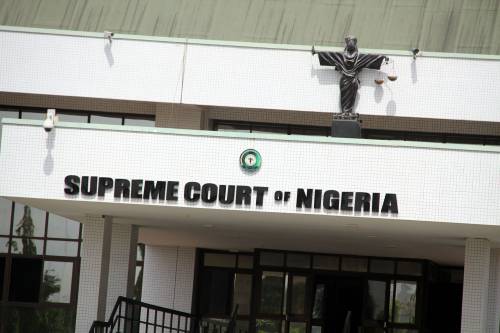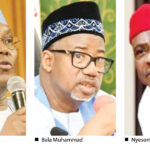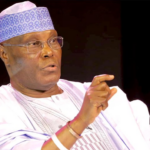The Supreme Court on Wednesday heard the appeals filed by the Peoples Democratic Party (PDP) and its presidential candidate, Atiku Abubakar, challenging the victory of President Muhammadu Buhari at the February 23 poll.
READ:LIVE: Supreme Court hears Atiku’s appeal against Buhari
Atiku and his party were challenging the September 11 judgement of the Justice Mohammed Garba-led Presidential Election Petitions Tribunal which affirmed President Buhari’s victory at the polls.
The appeals’ hearing has generated some controversies especially due to the silence of the Supreme Court on the justices that would constitute the panel, with the Coalition of United Progressives Party (CUPP) demanding the use of seniority in selecting them.
READ: Supreme Court upholds Buhari’s victory, dismisses Atiku’s appeal
The Chief Justice of Nigeria, Ibrahim Tanko Mohammed, presided over the 7-man panel that heard the appeals.
Other members of the panel are Bode Rhodes-Vivour, Olukayode Ariwoola, John Inyang Okoro, Amiru Sanusi, Ejembi Eko and Uwani Abba-Aji.
1 Hon. Justice Ibrahim Tanko Muhammad, CFR, JSC – The Chief Justice of Nigeria (CJN) and Presiding Judge

Hon. Justice I. T. Muhammad, CFR, JSC was born on the 31st of December 1953. He hails from Doguwa, Giade Local Government Area of Bauchi State.
He attended primary school at Giade Primary School from 1961 to 1968. He proceeded to Government Secondary School, Azare from 1969 to 1973.
He then proceeded to Abdullahi Bayero University College, Kano for his IJMB from 1975 to 1976. After a successful completion of his course, he got admission to read Law at Ahmadu Bello University, Zaria from 1976 to 1980. He attended Nigerian Law School from 1980 to 1981.
To further his educational career, Justice I. T. Muhammad went back to the ABU, Zaria for his Masters Degree in Law (LLM) on Part-Time basis, from 1982 to 1984. In order to update himself in the field of Law, he went back to ABU, Zaria in 1987 to 1998 and obtained his Doctorate Degree (PhD) in Law, also on Part-Time basis.
Hon. Justice I. T. Muhammad, CFR, JSC was appointed as Magistrate Grade II in 1982 to 1984 with Bauchi State Judiciary. He rose to Senior Magistrate Grade II from 1984 to 1986.
READ: Atiku loses at Supreme Court
Later, he was appointed as the Provost, College of Legal and Islamic Studies, Bauchi from 1986 to 1989 and then appointed as the Chief Magistrate/Deputy Chief Registrar, High Court of the Federal Capital Territory, Abuja from 1990 to 1991.
From 1991 to 1993, he served as a Kadi (Judge) of the Sharia Court of Appeal, Bauchi State. Justice I. T. Muhammad was elevated to the position of Justice of the Court of Appeal from 1993 to 2006.
He was appointed as Justice of the Supreme Court of Nigeria in the year 2006 and was sworn-in on the 8th of January 2007. He became the substantive Chief Justice of Nigeria and Chairman, National Judicial Council on Thursday, 25th July, 2019.
2 Hon. Justice Bode Rhodes-Vivour, CFR, JSC

Justice Olabode Rhodes-Vivour was born to the family of Mr and Mrs Akinwunmi Rhodes-vivour in 1951, in Lagos Island. He obtained his First School Leaving Certificate in 1963.
He went on to attend St Gregory’s College, Obalende, Lagos, where he obtained his West African Examination Council (WAEC) Certificate in 1968, and the Higher School Certificate (HSC) in 1970, before proceeding to University of Lagos where he graduated in 1974 with an LLB Honors.
Olabode Rhodes-Vivour attended the Lagos Law School and was called to the Nigerian Bar in 1975. He started his career as a Pupil State Counsel in 1976; and in 1978 he became a State Counsel and rose to become a Senior state Counsel by 1982. He was promoted to the position of Principal State Counsel in 1984, and by 1989 his hard work and career progression had earned him the position of Director of Public Prosecution (DPP) Lagos State, a position which he held until 1994.
Hon Justice Olabode Rhodes-Vivour was appointed to the bench as a Judge of the High Court of Justice, Lagos State, on 18th February, 1994. His distinct attributes of service led to his elevation to the Appeal Court on 25th April, 2005.
In 2008, on Secondment by the Government of the Federal Republic of Nigeria, he was posted to Sierra Leone Judiciary as Justice of the Supreme Court of Sierra Leone, whereupon his return in September, 2010, he was appointed as a Justice of the Supreme Court of the Federal Republic of Nigeria. He is currently the Deputy Chairman of the National Judicial Council (NJC).
Hon. Justice Olabode Rhodes-Vivour has attended various International and Professional conferences within and outside the country. He is a recipient of many notable awards amongst which are: Lagos State Judiciary Merit Awards in recognition of invaluable service to the High Court of Lagos state (2003); Commander of the Federal Republic of Nigeria (CFR 2012); and Life Bencher (2016).
His hobbies are reading, watching sports, movies and documentaries. He is married to Mrs Adedoyin Rhodes-Vivour and they are blessed with children.
3 Hon. Justice Olukayode Ariwoola, JSC

Justice Olukayode Ariwoola was born on August 22, 1954. He was appointed a Judge of the Oyo State High Court in 1992 and later made a Justice of the Court of Appeal in November 2005.
On November 22, 2011, he was appointed to the bench of the Supreme Court of Nigeria as Justice, and sworn in by the then Chief Justice of Nigeria.
Currently, he is also a Member of the Nigerian Bar Association, the International Bar Association, and the Nigerian Body of Benchers.
4 Hon. Justice John Inyang Okoro, JSC

Justice John Inyang Okoro, an indigene of Akwa Ibom state, was born on July 7, 1959.
Prior to becoming a Justice of the Supreme Court of Nigeria, he was a Judge of the High Court of Akwa-Ibom State from 1998 and thereafter got elevated to the position of Justice of the Court of Appeal in 2006.
His appointment as Justice of the Supreme Court of Nigeria was confirmed by the Senate on October 2013. He was sworn-in on November 15, 2013 by Justice Aloma Mariam Mukhtar, the former Chief Justice of Nigeria.
Justice Okoro was arrested by the Department of State Security Services (DSS), on 8 October 2016 on allegations of bribery and corruption. He was the second Supreme Court justice (alongside Justice Sylvanus Ngwuta, now retired), who was among the seven judges arrested in different states across the country over alleged corrupt practices.
Justice John Inyang Okoro was however recalled by the Supreme Court of Nigeria on June 3, 2017, having been acquitted by the court.
5 Hon. Justice Amiru Sanusi, OFR, JSC
Hon. Justice Amiru Sanusi, an indigene of Katsina state, was born in February 1950.
He bagged a Bachelors Degree in Law from the Ahmadu Bello University (ABU), Zaria and was called to the Nigerian Bar in 1978. Prior to becoming a Justice of the Supreme Court, he served as a judge in his home state, Katsina from 1990 to 1998, before he was promoted to the Court of Appeal in December 1998.
Justice Sanusi later bagged the National award of Officer of the Federal Republic of Nigeria (OFR) and was sworn-in by the then Chief Justice of Nigeria, Hon. Justice Mahmud Mohammed, GCON, on May 14, 2015.
6 Hon. Justice Ejembi Eko, JSC
Born on May 23, 1952, Justice Ejembi Eko, is from Ugboju in Otukpo Local Government Area of Benue state. He attended Methodist Primary School, Ogoli between 1958-62 and later joined Idoma Native Authority Primary School, Ugbokpo between 1963-65. He also attended Wesley High School, Otukpo from 1966-70 and later Government College, Keffi between 1971-72.
He went further to study Law at the University of Ife (now Obafemi Awolowo University) between 1973-76, and then attended the Nigerian Law School in 1976-77 and was called to bench thereafter.
He started his career as a pupil State Counsel, Ministry of Justice, Kaduna state in 1977. After his NYSC, he went into private legal practice with Omakwu and Co until 1980 when he was self- employed.
He joined the Benue State Ministry of Justice as the Director of Civil Litigation in 1987. He later became the state’s Solicitor-General and Permanent Secretary between 1987-89.
Between 1989 and 1999, he served as administrative Judge, Ankpa, Katsina-Ala, Makurdi and Otukpo from 1999 to December 2007. He has performed several sensitive assignments including Chairman, Benue State Committee on Review of 1999 Constitution.
In February 2008, he was appointed as a Judge of the Court of Appeal, Port Harcourt division, from where he was appointed as a Supreme Court Justice by President Muhammadu Buhari on November 4, 2016.
Currently, he is a member of the World Jurists Association (WJA) and Commonwealth Magistrates and Judges Association (CMJA). He is happily married and blessed with children.
7 Hon. Justice Uwani Musa Abba-Aji, JSC

Born in November 1956, in Gashua, Bade Local Government of Yobe state, Justice Uwani Musa Abba Aji, started from Central Primary School, Gashua and later Government Girls Secondary School, Maiduguri now Government Girls College.
She then proceeded to the Institute of Administration, Ahmadu Bello University, Zaria between 1974 and 1976 where she obtained a diploma in law. She later acquired an LLB from the same institution in 1980 and was called to the Bar in 1981.
After serving at various cadres, from Clerical Assistant, Area Courts Division in 1973 to Acting Chief Registrar, High Court of Yobe State, November to December 1991, Abba Aji was appointed as a High Court Judge on the 18th of December 1991. She was there until 22nd September 2004 when she was called up to serve at the Court of Appeal, Kaduna Division.
She joined other justices of the Appeal Court same day with Justices Mary Peter Odili and Kudirat Keke–Ekun.
Immediately her nomination was announced, the Civic Society Network Against Corruption (CSNAC), through its Chairman, Mr. Lanre Suraju, urged President Muhammadu Buhari not to confirm her name after the Senate had approved her confirmation as a Justice of the Supreme Court of Nigeria.
Justice Abba-Aji was one of the eight judicial officers, who were directed by the National Judicial Council (NJC) to excuse themselves from duties, effective from November 2, 2016 on the request of the Attorney General of the Federation (AGF) pending the outcome of their investigation by the DSS, on corruption allegation. She and others were however directed to resume duties on June 7, 2017 on the grounds that no charges were brought against them by the AGF at the conclusion of their investigation.
Justice Uwani Abba-Aji thus became the seventh woman to sit at the Supreme Court of Nigeria and the second from the North East region after Hon. Justice Clara Bata Ogunbiyi who is from Borno state. She is the only woman judge among the seven Supreme Court Justices who presided over PDP/Atiku Abubakar’s appeal over the last presidential election.




